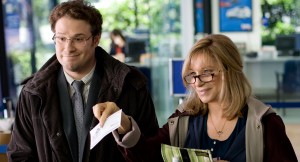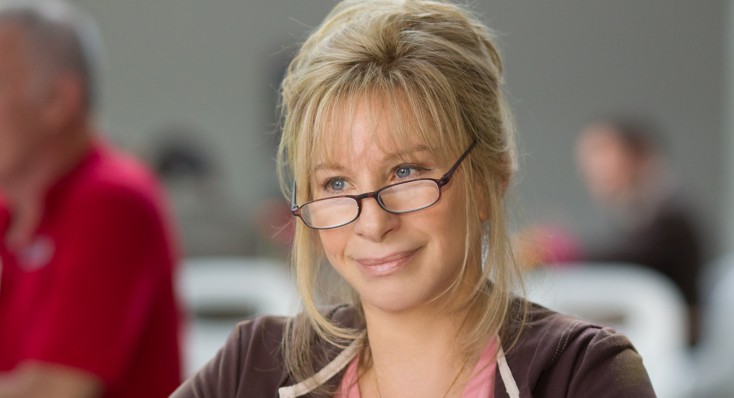
Left to right: Seth Rogen is Andrew Brewster and Barbra Streisand is Joyce Brewster in “THE GUILT TRIP.” ©Paramount Pictures. CR: Sam Emerson.
By ANGELA DAWSON
Front Row Features
HOLLYWOOD—After a successful go as Ben Stiller’s bohemian mom in “Meet the Fockers” (and “Little Fockers”), singing-acting-directing legend Barbra Streisand is back on the big screen, this time playing Seth Rogen’s overbearing mother in “The Guilt Trip.”
Streisand, 70, reveals that she initially wasn’t sure she wanted to make another movie. She was perfectly happy living a quiet life at her spacious Southern California home with her second husband, actor James Brolin, when her director friend Anne Fletcher (“The Proposal,” “27 Dresses”) guilted her into making the movie. Fletcher told her she wouldn’t make the movie, also starring Seth Rogen, without her.
After mulling it over while vacationing in France and talking it over with her son, actor-director Jason Gould (with first husband, actor Elliott Gould), Streisand agreed to star in the movie, written by “Tangled’s” Dan Fogelman, who based the comedy on a real life cross-country road trip he once took with his late mother, Joyce Fogelman.
Streisand says she thought the comedy was something she, and other moms, could relate to. Over the course of the production, she bonded with her gregarious co-star Rogen (of “Knocked Up” fame), who plays her put-upon son, who loves his mom though he finds her a bit aggravating sometimes.
The two-time Oscar winner recently spoke about her latest return to the big screen, and what it was like playing Seth Rogen’s mom.
Q: What was like meeting Seth for the first time?
Streisand: Seth sussed me out. He called people from the “Focker” movies. Ben Stiller.
Q: Did you suss him as well?
Streisand: I didn’t know who to call. I don’t know any of those people from his movies. So what I was going to do? (She laughs.) No. I thought he was adorable. I thought, this is interesting (and) unlikely, which makes it interesting, and yet, we’re both Jewish. I could be his mother.
Q: Are you as technologically challenged as your onscreen character?
Streisand: Yes, and yet he copied my iPhone. I was the one with the iPhone (first), but he would show me things on it. Like, yesterday, he asked me if I had a Twitter account. I said, I don’t know. I only use for it political purposes. I didn’t know it was there beyond that. I wouldn’t know how to find it on my phone.
Q: What gives you the greatest satisfaction as an artist, and what does it mean for you to be part of a project like this?
Streisand: I prefer things that are private, so I love recording, and I love making films as a filmmaker because it uses every bit of what you have experienced or know, whether it’s a graphics composition, decorating, psychology, storytelling, whatever. I was dealing with very talented people (on this). I loved Anne’s movie, “The Proposal.” And Dan did “Tangled.” I loved that. He’s very gifted writer. And Seth is terrific at what he does.
Q: What was the hardest thing in the movie to do?
Streisand: Eating steak. For a person who doesn’t like steak, that was the hardest part.
Q: What is tougher: comedy or drama?
Streisand: They’re both the same. If anything is based on what reaches an audience is the truth, it’s honesty. So if you’re saying something truthful that’s a funny line, it’s going to be funny. If it’s a serious line, it’s going to be serious, but I don’t think there’s a distinction between how you play drama or comedy if it’s based in the truth.
Q: What is the secret to your success?
Streisand: I don’t make that many movies, and I don’t make that many appearances. Less is more, and maybe that keeps a little mystery or something. I don’t know. I like to stay home a lot. I like to do other things. You know what I mean? Like decorate, build.
Q: How much contact did you and your son, Jason, have while you were thinking about how you wanted to play the role, and did he share some fun stories?
Streisand: He was very important in my decision to make the movie because he was recovering from back surgery. So he was in bed for a few days after. I brought the script over and read it out loud, and it was interesting actually. His father was in the room too. Isn’t that funny? We were both coddling our son. So he became the audience, and Jason was reading all the parts with me. And he said, “I think you should do it, mom.” I really trust his integrity and his opinion. He has great taste in whatever he chooses to do. It’s amazing. So he clinched the deal.
Q: Was there something in the script that you particularly connected with?
Streisand: Mothers develop guilt trips. When I was working a lot, I felt guilty as a parent that I couldn’t pick up my son every day from school, bake him cookies, that kind of thing. So I know that feeling. I know that feeling a lot. And so you try to compensate and everything they do is great. They sense that guilt—children—and they’re going through their own rebellious times or whatever. Having a famous parent is an odd thing. So I thought it was interesting to investigate this—trying to be my son’s friend, trying to be his friend versus a mother. And when it comes time to say, “You abused me. You disrespect me. You talk back to me. You don’t honor what I say. You won’t take my advice.”—that kind of thing, in terms of this movie, it hit on all those things that I thought I could explore. It was a true story.
Q: So the story hits close to home?
Streisand: It’s Dan and his mother, and she was a fan of mine. Dan wrote this lovely script. It just felt like it was meant to be, meant for me to come back to work in a starring role rather than six days on a movie, which I really like, just six days on a movie. But it was time to challenge myself again. Of course, I made it very difficult for them to hire me because I kept wanting an out some way. So I made it really hard.
Q: How so?
Streisand: I’d say—and I never do this normally –I really don’t want to schlep to Paramount (Pictures). It’s two hours each way (from my house). So would you rent a warehouse and build the sets in the (San Fernando) Valley no more than 45 minutes from my house? And they said, yes. On these “Focker” movies, I had to get up early, and I’m not an early bird. As Seth says, it’s very hard to be funny at 7:30 a.m. I love the night. My husband and I stay up until 2 or 3 in the morning, so we don’t function that well at 6 a.m. And they said, Okay.
Q: What made you want to do it?
Streisand: I was on a little boat in France, and I said to my friend who’s an architectural critic, “I don’t know if I want to do this movie,” and he said, “An actor has a craft, and you’re an actor. You should be using your craft.” That was interesting. Like, do it. Do your thing.
Q: Do you think they would have made this movie without you had you said no?
Streisand: I remember on the boat, I said to Anne, “Well. Would you make the movie without me?” And she said, “No.” And I felt bad, guilty—another guilt trip, right? I said, “Oh, no. She’s not going to have this job, and I want her to work.”
Q: I imagine you get sent so many scripts.
Streisand: I don’t. Everybody thinks like you. “Oh, she must get so many scripts. Why should I send it? She’ll never get a chance to read it.” Meanwhile, I go, “Where are the scripts?”
Q: What do you want the fans to take away from the film?
Streisand: I want them to be moved. I want to identify. I want them to see themselves in the movie. I want them to get closer to their children, a lot of things.
Q: You look so beautiful in the film, and here today. So what is your secret?
Streisand: God, what is my secret? (She laughs.) If you knew all my self doubt, my God. I don’t know. Maybe I’m slightly childish or something like that. I kind of like the child part of me. Maybe it reflects in my face or something.
Q: You can sing. You can act, you write, you direct, so what can you not do well?
Streisand: I can’t cook. I can’t cook at all. I mean I would not know how to make coffee. Sort of boil an egg, maybe I could figure that one out. I took cooking classes. By the way, I know how to make chocolate souffle.
Q: Have you made one lately?
Streisand: I let somebody else make the chocolate souffle, and I eat it.
Q: How would you describe this movie to someone who hasn’t seen it?
Streisand: It’s a transformative kind of movie. They start at one point—both of them— kind of tragically alone, not finding a mate. And then, at the end, there are many more possibilities. The horizon’s open. There’s more to life than the (generation) gap. He took me out of my shell. It was a very loving gesture. So it’s about love. I always say it’s a different kind of love story.
Q: Whom do you trust to tell you the absolute truth about your performance and who is it that will simply tell you what he or she thinks of you?
Streisand: It’s hard because it’s between my husband and my son and my manager of 50 years. I trust several people. I don’t like to be shmuckled. You know what that means? How do you describe that? It’s a great Yiddish word. That means smeared. I like the truth.
Q: As a veteran of movie musicals like “Funny Girl” and “On a Clear Day,” what do you think about the performers in “Les Miserables” being recorded as they performed their numbers instead of prerecording their songs and then lip-synching during filming?
Streisand: “A Star Is Born” was done live. I sang live. I sang live at the end of “Funny Girl,” because that’s what they’re talking about in Les Mis. Because I said to Willie (Wyler), “How do you know where the emotion is going to hit you? when I was doing “My Man” at the end. I’m a terrible lip-syncher anyway because I have to be in the moment. I can’t lip-synch to something that I recorded three months before. So I thought it was great that (“Les Miserables” director) Tom Hooper used that. Let the actors be live.
Q: How you feel about being a movie icon? Do you think your son considers you an icon?
Streisand: He doesn’t see me as an icon. He sees me as his mother who touches his hair too much.





